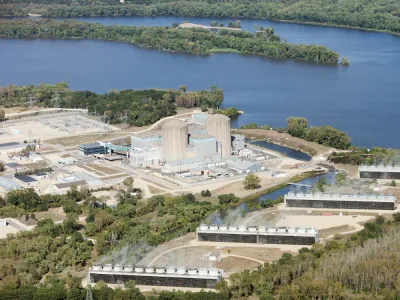Xcel argues that its customers should pay for accident at its nuclear power plant

Read our previous articles on the Prairie Island nuclear facility outage below.
Xcel’s customers shouldn’t pay for Xcel’s failure to “call before you dig” at its Prairie Island nuclear facility
PUC: Xcel’s imprudence led to Prairie Island outage; customers to receive refunds
On October 19, 2023, workers drilling at Xcel’s Prairie Island nuclear facility inadvertently severed buried power cables. This caused a 103-day outage at the Prairie Island Unit 1 facility that lasted from October 19, 2023 to January 30, 2024. The incident also extended what had been a planned outage at the Unit 2 facility, which was already undergoing maintenance at the time of the incident but could not be started up again until after the damaged cables were repaired.
During the outage caused by the drilling incident, Xcel paid tens of millions of dollars for replacement power to make up for the electricity not being generated by the Prairie Island facility. Xcel initially passed those extra costs through to its customers. However, the Minnesota Department of Commerce caught this and raised alarms. With support from the Attorney General's Office and CUB, the Minnesota Public Utilities Commission issued an order last year finding that Xcel must reimburse ratepayers for the costs of their error. Now, a proceeding is underway to determine the exact amount of the reimbursement owed. This article provides an update on where that proceeding currently stands.
What has happened so far
As Xcel disclosed to the U.S. Nuclear Regulatory Commission in a May 21, 2024 Licensee Event Report, “weakness in the Excavation Permit approval process as well as inadequate oversight of the personnel performing the work” caused workers drilling at the Prairie Island site to drill through buried power cables. Upon reviewing this Report, the PUC determined Xcel “acted imprudently regarding the October 2023 outage,” noting “Xcel knew or should have known that critical cables could be buried in the vicinity of the planned excavation site at a nuclear power plant.” The PUC also noted that Xcel “failed to provide any explanation [of] how its oversight of the excavation project was prudent in light of the deficiencies highlighted by the commentors and identified by Xcel” in its own Licensee Event Report.”
As a consequence of that imprudence, the PUC ordered Xcel to issue a refund to its customers but did not decide how much money should be refunded. Instead, the PUC referred the matter to the Minnesota Office of Administrative hearings so additional evidence could be developed to determine the appropriate refund amount.
On May 1, 2025, Xcel filed testimony estimating that the additional cost of purchasing power due to this accident was $34.5 million. However, the company argued it should not have to refund customers that full amount because (according to Xcel) the work it did to remedy its mistake also benefited customers—and those benefits should “offset” the refund amount. Xcel’s arguments are based on the claims that (1) it avoided future outages by replacing aging cables rather than simply repairing the damage; (2) other supplemental maintenance performed while the plant was already experiencing an outage reduced the need for future outages; and (3) any refund owed to customers stemming from Xcel’s imprudence should be reduced because Xcel has otherwise operated Prairie Island successfully. According to Xcel, these offsets should reduce the refund owed to customers to just $5.8 million.
These arguments are largely baseless. For one, the PUC very recently decided, in a different case, that Xcel may not offset a customer refund based on other benefits that may have arisen from Xcel’s efforts to remedy its own imprudence. Further, the PUC has already twice considered and rejected (both in its initial order ordering a customer refund and a subsequent order denying Xcel’s request for reconsideration of that initial order) Xcel’s argument that its operation of the Prairie Island facility should excuse it from accountability for the drilling mistake. Xcel’s attempt to re-raise that argument for a third time is outside the scope of the contested case.
On July 2, the Department, OAG, CUB and a group of Xcel’s large industrial customers filed a joint motion requesting that the judge overseeing the contested case summarily dismiss most of the offsets Xcel proposed. On this same date, the Department, OAG, and Xcel’s large industrial customers also filed expert witness testimony responding to the company’s arguments.
What happens next?
Xcel will file rebuttal testimony on August 13 responding to testimony filed by the Department, OAG, and Xcel’s large industrial customers. The parties challenging Xcel’s proposed refund will then have an additional opportunity to file testimony on September 17. In the meantime, Xcel will likely file a response to the joint motion requiring summary dismissal of some of Xcel’s arguments. Later this fall, all parties to the contested case will file briefs outlining their legal arguments. Next March, the judge overseeing the case will file a report outlining her findings and making a recommendation to the PUC. The PUC has the final say as to the appropriate refund amount owed to Xcel’s customers and is likely to make its decision in spring 2026.
If you are frustrated by Xcel’s actions and do not think customers should pay for replacement power costs, you can file a public comment by following the directions here. Be sure to note the comments relate to docket 22-179. In the meantime, keep an eye on the CUB website for additional updates on this issue.